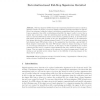Free Online Productivity Tools
i2Speak
i2Symbol
i2OCR
iTex2Img
iWeb2Print
iWeb2Shot
i2Type
iPdf2Split
iPdf2Merge
i2Bopomofo
i2Arabic
i2Style
i2Image
i2PDF
iLatex2Rtf
Sci2ools
111
click to vote
ICICS
2004
Springer
2004
Springer
Factorization-Based Fail-Stop Signatures Revisited
Fail-stop signature (FSS) schemes are important primitives because in a fail-stop signature scheme the signer is protected against unlimited powerful adversaries as follows: Even if an adversary breaks the scheme’s underlying computational hard problem and hence forges a signature, then with overwhelming probability the signer is able to prove that a forgery has occurred (i.e. that the underlying hard problem has been broken). Although there is a practical FSS scheme based on the Discrete Logarithm problem, no provable secure FSS scheme is known that is based on the pure factorization problem (i.e. the assumption that integer factoring for arbitrary integers is hard). To be more concrete, the most popular factorization based FSS scheme relies on the assumption that factoring a special kind of Blum integers is intractable. All other FSS schemes related to integer factoring are based on even stronger assumptions or insecure. In this paper, we first cryptanalyze one of those schemes an...
| Added | 01 Jul 2010 |
| Updated | 01 Jul 2010 |
| Type | Conference |
| Year | 2004 |
| Where | ICICS |
| Authors | Katja Schmidt-Samoa |
Comments (0)

